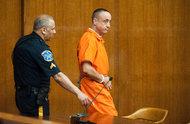Newark Monsignor Loses Job for Improperly Monitoring Priest near Children
By Marc Santora
One of the top officials in the Archdiocese of Newark has been forced out for failing to properly monitor the activities of a priest who had been forbidden from having contact with children, the archdiocese announced on Saturday. The departure of Msgr. John E. Doran, who reported to Archbishop John J. Myers, is the latest fallout from a sexual abuse scandal that stretches back more than a decade. In 2003, the Rev. Michael Fugee was convicted on charges that he groped a young boy. Although the verdict was later overturned over a judicial error, Father Fugee, to avoid another trial, entered into an agreement with the Bergen County prosecutor’s office that he would enter sex-offender treatment and have no unsupervised contact with children as part of his church duties. Monsignor Doran was responsible for supervising Father Fugee, according to court documents. In April, however, The Star Ledger reported that Father Fugee had been openly working with children again, hearing their confessions, attending youth retreats and even posting photos of himself with boys on his Facebook page. After the revelations were made public, the Rev. Thomas Triggs, the pastor of the church in Colts Neck, N.J., where Father Fugee attended youth retreats, resigned under pressure from the bishop of Trenton, David M. O’Connell. (Colts Neck is part of the Diocese of Trenton.) Yet Archbishop Myers’s office continued to publicly defend its handling of the case until last week, when Father Fugee was arrested on a charge of violating the agreement with prosecutors. In a letter to parishioners, a column in The Star Ledger and a video on the archdiocese’s Web site, Archbishop Myers acknowledged that the church leadership had failed. “The investigation uncovered certain operational vulnerabilities in our own systems,” he said. “We found that the strong protocols presently in place were not always observed.” He did not say what specific protocols had been violated. “As a result of operational failures, both Monsignor Doran and I felt that the archdiocese would be best served by his stepping down as vicar general,” Archbishop Myers said. “This action clears the way for making more effective changes in our monitoring function.” Father Fugee’s lawyer, Michael D’Alessio, did not return a call seeking comment. Monsignor Doran, who had previously been the pastor of St. Cassian Church in Montclair, N.J., signed the letter from the archbishop. He could not be reached for comment Saturday. The archdiocese characterized his departure as a resignation. Archbishop Myers, while noting the failures in this case, defended how his office had handled allegations of sexual abuse over all. “We want our procedures to be among the strictest in the entire Catholic Church,” he said. “This has been one of my priorities since becoming archbishop in 2001 and that will not change. In fact, the archdiocese has an exemplary record of addressing allegations against our clergy. During my tenure I have personally removed 19 priests for substantiated allegations.” The case of Father Fugee has stoked outrage among parishioners and politicians in New Jersey. It appeared to be a clear violation of the child protection policies the American bishops adopted in 2002, at the height of the sexual abuse scandal, which pledged that any priest faced with credible accusations of child sexual abuse may not continue working in ministry. This “zero tolerance” approach was approved by Pope John Paul II. But few of the accused priests have been prosecuted in the criminal justice system because most of the cases are beyond the statutes of limitations, which require abuse to be reported within a few years after it occurred even though many abuse victims take years to come to grips with what happened to them or are afraid to report it. The prosecution of Father Fugee was an exception. The Archdiocese of Newark has compounded the budding scandal with inconsistent explanations. The spokesman for the archdiocese, James Goodness, initially said that Father Fugee had been under supervision while working in a parish in the Trenton diocese, so it was not a violation of the agreement that Father Fugee and the archdiocese had with prosecutors. Soon after, the archdiocese changed its response, with Mr. Goodness saying that Father Fugee was ministering without the knowledge or permission of the archdiocese. Father Fugee has stepped down from ministry. The archdiocese has not said whether it will seek to remove him from the priesthood, a process known as laicization, which requires Vatican approval. Archbishop Myers said that he would be appointing a new special adviser to the Archdiocesan Review Board and would provide more resources to investigate allegations of sexual misconduct. “We are not perfect,” he said. “But people who suggest we have not taken seriously the oversight of our clergy and do not put the security and safety of our families and parishioners, especially our children, at the forefront of our ministry are just plain wrong.” Robert Hoatson, a former priest in the Newark Archdiocese and the president of Road to Recovery, a victims’ rights organization, praised the decision to dismiss Monsignor Doran, but added that it did not go far enough. “The Newark Archdiocese will not heal until Archbishop Myers has resigned or been removed,” Mr. Hoatson said.
|
.
Any original material on these pages is copyright © BishopAccountability.org 2004. Reproduce freely with attribution.
